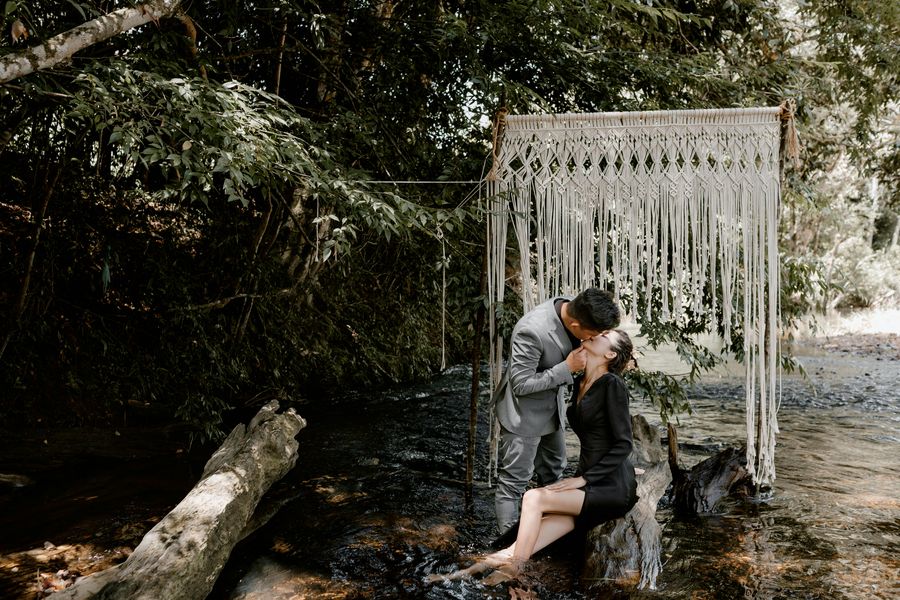The Importance of Personal Space in a Relationship
Are you tired of constantly being together with your partner? Do you struggle with setting boundaries in your relationship?
Maintaining personal space in a relationship is crucial for both individuals to thrive and maintain a healthy and happy partnership.
Benefits of maintaining space in a relationship
Individuality
It’s essential to remember that we are all unique individuals with our own interests, hobbies, and passions. By maintaining personal space in a relationship, each partner can maintain their individuality and pursue their passions, which ultimately leads to personal growth and greater satisfaction in life.
Boundaries
Having boundaries in a relationship is crucial to ensuring that each partner’s needs are being met. By clearly defining what is and isn’t acceptable behavior, each partner can feel safe and secure in the relationship.
Mental Health
Taking some time to be alone and recharge can significantly impact your mental health. When we have space in a relationship, we can take the time to reflect, recharge, and come back to the partnership with a renewed sense of energy and purpose.
Conflict
Space in a relationship can also reduce conflicts and prevent them from becoming more significant issues. When partners feel like they can take space when things get tough, they are less likely to become overwhelmed and tackle small issues before they become significant conflicts.
Mystery
Maintaining individuality and separate interests allows for an air of mystery in the relationship. It keeps the romance alive by allowing partners to continuously learn and discover new things about each other.
Co-Dependency
When we rely too heavily on our partner for emotional support and validation, we can become co-dependent. Co-dependency can be incredibly detrimental to personal growth and the health of a relationship.
By maintaining personal space, we can avoid co-dependent tendencies and stay grounded in our individuality. How much space is normal in a relationship?
It’s essential to remember that every relationship is unique, and space is subjective. Some couples prefer to spend all their free time together, while others may need more alone time to recharge.
However, it is healthy for couples to have personal hobbies, mutual interests, separate physical and time-space, emotional, and financial space.
Personal hobbies
Encouraging your partner to pursue their hobbies and passions, and nurturing your own interests, can lead to a more fulfilled and satisfying life.
Mutual interests
While having personal space is crucial, it’s also essential to make sure you have shared interests that you can enjoy together. This helps couples stay connected and continue to grow as a couple.
Separate physical and time-space
Establishing clear boundaries and communicating about how much space you need can be immensely helpful. It’s okay, not to want to spend every moment with your partner.
Emotional and financial space
It’s also essential to ensure that both partners have emotional and financial independence. Having autonomy in these areas can help avoid co-dependency and lead to healthier relationships.
Creating and fostering healthy space in a relationship
Establishing ground rules that both partners can agree on can help manage expectations and make sure that both parties are satisfied with the arrangement. Nurturing personal hobbies: Encouraging each other to pursue their interests and passions is crucial to maintaining individuality and healthy space in a relationship.
Encouraging your partner: It’s essential to respect and support each other’s need for space and encourage your partner to take alone time when they need it. Creating separate physical and time-space: Designating a separate area of the house for each partner to pursue their interests and hobbies is a great way to create physical space.
Scheduling alone time or date nights with friends is a great way to create time-space as well. Addressing insecurities and anxieties: Sometimes, a partner may feel anxious or insecure about their partner wanting space.
It’s essential to have open and honest communication about these feelings and work together to address them. In conclusion, personal space is a vital aspect of any healthy relationship.
Maintaining personal space can lead to greater individuality, the establishment of boundaries, better mental health, preventing conflicts, creates an air of mystery, and avoiding co-dependency. While the amount of space needed in a relationship is subjective, establishing personal hobbies, mutual interests, separate physical and time-space, emotional, and financial space can lead to a happier and healthier relationship.
Don’t be afraid to communicate your needs and establish ground rules with your partner to foster a more fulfilling partnership. 3) Is space in a Relationship Healthy?
As social creatures, we naturally crave close relationships and connections. Yet, we also need time alone to maintain our sense of individuality and pursue personal interests.
Finding the right balance between closeness and space is key when it comes to maintaining a healthy and happy relationship.
Benefits of maintaining space in a relationship
Individuality
When we maintain sufficient personal space in our relationships, we can continue to grow and develop our sense of self. We can explore our own interests and passions, attend events with our friends, and have time for hobbies.
When we have a strong sense of individuality, we can be more present and content in our relationships; we don’t have to rely on our partners for validation.
Boundaries
Having well-defined boundaries is essential for healthy relationships.
When partners have an appropriate amount of space, they can avoid co-dependency and have more autonomy in decision-making and behavior. Having clear boundaries also minimizes conflict in the relationship.
Mental Health
Taking time for ourselves helps us recharge and maintain a healthy perspective. Time alone allows us to reflect, plan and come back to our relationships feeling refreshed and energized.
Space in a relationship can help alleviate stress and promote good mental health.
Conflict
Resentment in a relationship can occur when individuals feel that their space is being infringed upon.
When each partner has their own interests and hobbies, conflict can be avoided by not engaging in exclusive activities. It’s also helpful to have relationships outside of the partnership, so one individual isn’t completely dependent on the other.
Mystery
Space leaves room for intimacy and closeness. Having some individuality and alone time can keep a relationship interesting, leading to a sense of mystery and admiration for each other’s unique interests and passions.
Co-dependency
When a couple relies too heavily on each other for emotional support, validation, or tasks, it can lead to co-dependency. Co-dependency is an unhealthy dynamic that negatively affects personal growth and is generally bad for the long-term health of the relationship.
The Early Years of Marriage Project study
The Early Years of Marriage Project, a longitudinal study of married couples in the United States, revealed that couples who reported privacy and self-time were happier and more satisfied with their marriage. The study found that individuals who had sufficient alone time felt more confident in the relationship and like it when their partner did the same.
In contrast, couples who did not have sufficient privacy or self-time reported being unhappy, felt constrained, and like they were missing out. Another critical finding from the study was a link between a lack of privacy or self-time and sexual unfulfillment in the relationship.
In many couples, unhappy partners were not engaging in sexual activity, and when asked, they attributed it to a lack of privacy or autonomy.
How much space is normal in a relationship?
The amount of space that couples need varies based on each individual and their unique relationship dynamics. However, there are some general guidelines for how much space is healthy.
Personal Hobbies
Pursuing individual activities independent of your partners is essential. Setting aside time for hobbies and interests means that partners can enjoy some time alone while still feeling fulfilled and connected.
Mutual Interests
It’s also helpful to have shared activities and interests. Creating space to enjoy these activities can strengthen the relationship and lead to more quality time together.
Separate Physical and Time-Space
It’s essential to find a balance between time spent together and time spent apart. Establishing a routine that includes common interests and personal space is crucial.
Everyone should have a dedicated area in the house to pursue individual passions and interests.
Emotional and Financial Spaces
Emotional and financial separation are crucial areas to develop and work on as a couple.
It’s essential to develop a life of your own while still working together as a team in a relationship.
Creating and fostering healthy space in a relationship
Having a conversation and creating boundaries together is vital. It is important to determine how much space each person desires and the ways you can communicate and support each other while apart.
Nurturing Personal Hobbies
Encourage each other to pursue their interests and passions. Doing so will lead to individual growth and happiness in the relationship.
Encouraging Your Partner
Support each other when it comes to personal interests and hobbies and communicate that you trust each other to maintain a healthy relationship with the correct balance of time spent together and apart.
Creating Separate Physical and Time-Space
Make time to schedule alone time or date nights with friends. It is important to have a routine and to work together to facilitate time spent apart.
Addressing Insecurities and Anxieties
Discuss your concerns, be transparent, and open with each other. Making room for open communication and honesty is key, especially when it comes to personal space.
It is essential to be mindful of any insecurities and anxieties in the relationship. In conclusion, having space in a relationship is healthy and necessary.
Maintaining individuality, setting boundaries, establishing alone time, having personal hobbies, and mutual interests are all ways to foster healthy space in a relationship. Partners who prioritize personal space report greater satisfaction and enjoyment in their relationship.
It is crucial to communicate your needs, establish ground rules, nurture personal hobbies, create separate physical and time-space, address insecurities and anxieties to foster a relationship with a healthy balance of space and togetherness.
5) Creating and Fostering Healthy Space in a Relationship
Maintaining healthy space in a relationship is essential for personal growth and the long-term health of the relationship. Having space in a relationship is not about neglecting your partner; instead, it’s about striking a balance between maintaining your individuality while building on the connection with your partner.
In this section, we’ll explore how to create and foster healthy space in a relationship by establishing ground rules, nurturing personal hobbies, encouraging your partner, and creating separate physical and time-space.
Ground Rules
Establishing ground rules is essential when it comes to creating healthy space in a relationship. Each person in the relationship should feel safe and secure in the knowledge that their needs and boundaries will be respected.
Some examples of ground rules that can foster healthy space in a relationship include:
- Scheduling set times for alone time or alone time with friends
- Agreeing on limitations for phone use or screen time when you are together
- Being mindful of each other’s boundaries and respecting them
- Agreeing to communicate openly and honestly about personal space needs
By taking the time to establish ground rules together, both partners can be open and transparent about their personal space needs, goals, and expectations.
Nurturing Personal Hobbies
Encouraging your partner to pursue their passions and developing your own personal interests is important to maintain individuality in the relationship. It’s important to remember that each person in a partnership has their own unique personalities, interests, and goals.
Just as it’s important to nurture shared interests together, it’s also important to make time for individual pursuits. Whether it’s pursuing a hobby, taking a solo trip, or engaging in your favorite sport or activity, having personal time and space can lead to a renewed sense of purpose and fulfillment.
When both partners respect and support each other’s passions and interests, they are likely to feel more secure in their individuality and more connected in the relationship.
Encouraging Your Partner
It can be challenging to take time for oneself without feeling guilty or as though you’re neglecting your partner. Encouraging each other to pursue personal passions and interests is crucial to maintain a healthy balance of space in a relationship.
Ways to encourage your partner include:
- Acknowledge and support personal achievements and milestones
- Be understanding of each other’s schedules and commitments
- Offer to help your partner pursue a passion or interest
By fostering an environment of mutual support and respect, partners are more likely to feel confident and secure in themselves and each other. This approach can also lead to more meaningful conversations and deeper connections in the long run.
Creating Separate Physical and Time-Space
Creating physical space while still being part of a relationship is essential. It can be difficult to balance alone time with spending quality time with your partner.
Creating separate physical space can involve physical boundaries, such as having a designated space in the home for your hobbies or activities, or scheduling time for alone time and social events. Creating time-space is equally important, and involves setting aside specific amounts of time for personal pursuits, hobbies, friends, and family.
Time-space is important because it allows both partners to breathe and recharge in their own way, and retain a sense of autonomy while actively being in a relationship. By setting personal boundaries, partnering couples reduce the likelihood of developing co-dependent tendencies.
Healthy space allows individuals to maintain their sense of self, maintain emotional stability, and reduces the level of anxiety and tension in the relationship. In conclusion, while cultivating healthy space in a relationship can be challenging, it is attainable.
By establishing ground rules, encouraging personal interests, nurturing separate physical and time-space and creating an environment of mutual support and respect, couples can stay in tune with their personal development while building a lasting and fulfilling relationship. Remember, creating a healthy space is all about finding the right balance that works for both individuals in the relationship.
In conclusion, maintaining healthy space in a relationship is critical to an individual’s mental health and the long-term well-being of the partnership. Cultivating a balance between maintaining individuality while strengthening the connection with a partner requires effort and open communication.
Benefits of creating healthy space in a relationship include establishing individuality, setting boundaries, avoiding co-dependency, and taking mental breaks. Regardless of each couple’s unique circumstances, establishing personal hobbies, nurturing mutual interests, creating separate physical and time-space, and setting ground rules for the relationship are all vital components to achieve a healthy and satisfying partnership.



